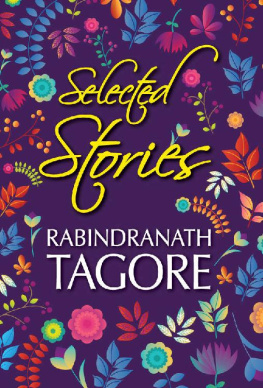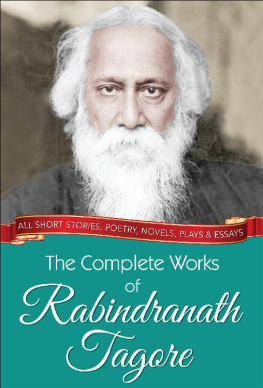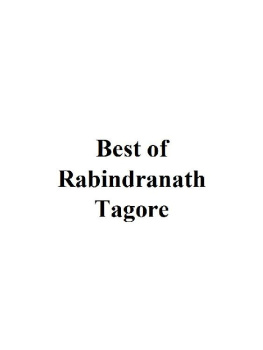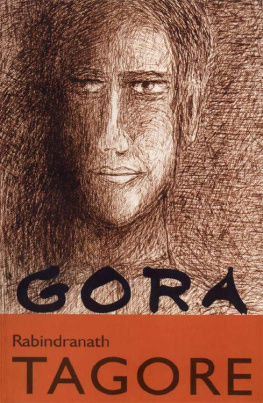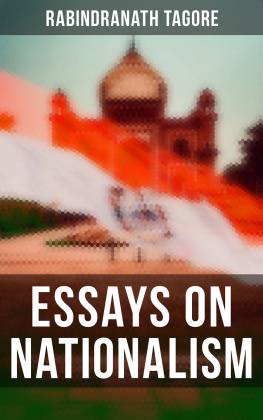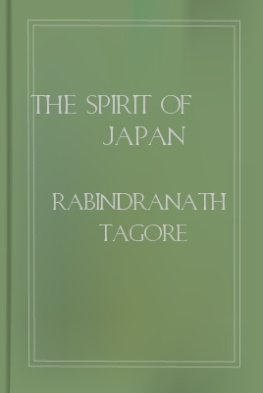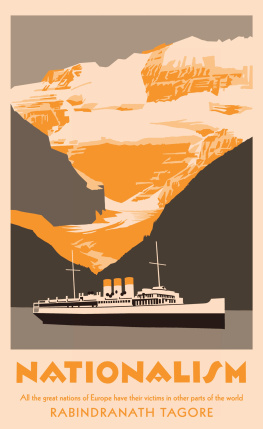Rabindranath Tagore - Selected Stories of Rabindranath Tagore
Here you can read online Rabindranath Tagore - Selected Stories of Rabindranath Tagore full text of the book (entire story) in english for free. Download pdf and epub, get meaning, cover and reviews about this ebook. year: 2014, publisher: General Press), genre: Non-fiction. Description of the work, (preface) as well as reviews are available. Best literature library LitArk.com created for fans of good reading and offers a wide selection of genres:
Romance novel
Science fiction
Adventure
Detective
Science
History
Home and family
Prose
Art
Politics
Computer
Non-fiction
Religion
Business
Children
Humor
Choose a favorite category and find really read worthwhile books. Enjoy immersion in the world of imagination, feel the emotions of the characters or learn something new for yourself, make an fascinating discovery.
- Book:Selected Stories of Rabindranath Tagore
- Author:
- Publisher:General Press)
- Genre:
- Year:2014
- Rating:5 / 5
- Favourites:Add to favourites
- Your mark:
- 100
- 1
- 2
- 3
- 4
- 5
Selected Stories of Rabindranath Tagore: summary, description and annotation
We offer to read an annotation, description, summary or preface (depends on what the author of the book "Selected Stories of Rabindranath Tagore" wrote himself). If you haven't found the necessary information about the book — write in the comments, we will try to find it.
Rabindranath Tagore: author's other books
Who wrote Selected Stories of Rabindranath Tagore? Find out the surname, the name of the author of the book and a list of all author's works by series.
Selected Stories of Rabindranath Tagore — read online for free the complete book (whole text) full work
Below is the text of the book, divided by pages. System saving the place of the last page read, allows you to conveniently read the book "Selected Stories of Rabindranath Tagore" online for free, without having to search again every time where you left off. Put a bookmark, and you can go to the page where you finished reading at any time.
Font size:
Interval:
Bookmark:

Published by GENERAL PRESS 4228/1, Ansari Road, Daryaganj New Delhi 110002 Ph. : 011 23282971, 45795759 e-mail : generalpressindia@gmail.com www.generalpress.in General Press All rights reserved. No part of this publication may be reproduced, stored in a retrieval system, or transmitted, in any form or by any meanselectronic, mechanical, photocopying, recording or otherwisewithout the prior written permission of the publishers. First Edition : 2014 ISBN : 9789380914770 1 1 0 9 2 0 1 7 |
Rabindranath Tagore (1861-1941) was the youngest son of Debendranath Tagore, a leader of the Brahmo Samaj , which was a new religious sect in nineteenth-century Bengal and which attempted a revival of the ultimate monistic basis of Hinduism as laid down in the Upanishads . He was educated at home; and although at seventeen he was sent to England for formal schooling, he did not finish his studies there. In his mature years, in addition to his many-sided literary activities, he managed the family estates, a project which brought him into close touch with common humanity and increased his interest in social reforms. He also started an experimental school at Shantiniketan where he tried his Upanishadic ideals of education. From time to time he participated in the Indian nationalist movement, though in his own non-sentimental and visionary way; and Gandhi, the political father of modern India, was his devoted friend. Tagore was knighted by the ruling British Government in 1915, but within a few years he resigned the honour as a protest against British policies in India.
Tagore had early success as a writer in his native Bengal. With his translations of some of his poems he became rapidly known in the West. In fact his fame attained a luminous height, taking him across continents on lecture tours and tours of friendship. For the world he became the voice of Indias spiritual heritage; and for India, especially for Bengal, he became a great living institution.
Although Tagore wrote successfully in all literary genres, he was first of all a poet. Among his fifty and odd volumes of poetry are Manasi (1890) {The Ideal One}, Sonar Tari (1894) {The Golden Boat}, Gitanjali (1910) {Song Offerings}, Gitimalya (1914) {Wreath of Songs}, and Balaka (1916) {The Flight of Cranes}. The English renderings of his poetry, which include The Gardener (1913), Fruit-Gathering (1916), and The Fugitive (1921), do not generally correspond to particular volumes in the original Bengali; and in spite of its title, Gitanjali: Song Offerings (1912), the most acclaimed of them, contains poems from other works besides its namesake. Tagores major plays are Raja (1910) { The King of the Dark Chamber }, Dakghar (1912) { The Post Office }, Achalayatan (1912) {The Immovable}, Muktadhara (1922) {The Waterfall}, and Raktakaravi (1926) { Red Oleanders }. He is the author of several volumes of short stories and a number of novels, among them Gora (1910), Ghare-Baire (1916) { The Home and the World }, and Yogayog (1929) { Crosscurrents }. Besides these, he wrote musical dramas, dance dramas, essays of all types, travel diaries, and two autobiographies, one in his middle years and the other shortly before his death in 1941. Tagore also left numerous drawings and paintings, and songs for which he wrote the music himself.

My five-year old daughter Mini cannot live without chattering. I really believe that in all her life she has not wasted a minute in silence. Her mother is often vexed at this, and would like to stop her prattle, but I would not. For Mini to be quiet is unnatural, and I cannot bear it long. And so my own talk with her is always lively.
One morning, for instance, when I was in the midst of the seventeenth chapter of my new novel, my little Mini stole into the room, and putting her hand into mine, said: Father! Ramdayal, the door-keeper, calls a crow a krow! He doesnt know anything, does he?
Before I could explain to her the difference between one language and another in this world, she had embarked on the full tide of another subject. What do you think, Father? Bhola says there is an elephant in the clouds, blowing water out of his trunk, and that is why it rains!
And then, darting off anew, while I sat still, trying to think of some reply to this: Father! What relation is Mother to you?
With a grave face I contrived to say: Go and play with Bhola, Mini! I am busy!
The window of my room overlooks the road. The child had seated herself at my feet near my table, and was playing softly, drumming on her knees. I was hard at work on my seventeenth chapter, in which Pratap Singh, the hero, has just caught Kanchanlata, the heroine, in his arms, and is about to escape with her by the third-storey window of the castle, when suddenly Mini left her play, and ran to the window, crying: A Cabuliwallah! A Cabuliwallah! And indeed, in the street below, there was a Cabuliwallah, walking slowly along. He wore the loose, soiled clothing of his people, and a tall turban; he carried a bag on his back, and boxes of grapes in his hand.
I cannot tell what my daughters feelings were when she saw this man, but she began to call him loudly. Ah! thought I; he will come in, and my seventeenth chapter will never be finished! At that very moment the Cabuliwallah turned, and looked up at the child. When she saw this, she was overcome by terror, and running to her mothers protection, disappeared. She had a blind belief that inside the bag, which the big man carried, there were perhaps two or three other children like herself. The pedlar meanwhile entered my doorway and greeted me with a smile.
So precarious was the position of my hero and my heroine, that my first impulse was to stop and buy something, since Mini had called the man to the house. I made some small purchases, and we began to talk about Abdur Rahman, the Russians, the English, and the Frontier Policy.
As he was about to leave, he asked: And where is the little girl, sir?
And then, thinking that Mini must get rid of her false fear, I had her brought out.
She stood by my chair, and looked at the Cabuliwallah and his bag. He offered her nuts and raisins, but she would not be tempted, and only clung closer to me, with all her doubts increased.
This was their first meeting.
A few mornings later, however, as I was leaving the house, I was startled to find Mini, seated on a bench near the door, laughing and talking, with the great Cabuliwallah at her feet. In all her life, it appeared, my small daughter had never found so patient a listener, save her father. And already the corner of her little sari was stuffed with almonds and raisins, the gift of her visitor. Why did you give her those? I said, and taking out an eight-anna piece, I handed it to him. The man accepted the money without demur, and put it into his pocket.
Alas, on my return, an hour later, I found the unfortunate coin had made twice its own worth of trouble! For the Cabuliwallah had given it to Mini; and her mother, catching sight of the bright round object, had pounced on the child with: Where did you get that eight-anna piece?
The Cabuliwallah gave it me, said Mini cheerfully.
The Cabuliwallah gave it you! cried her mother greatly shocked. O Mini! How could you take it from him?
I entered at that moment, and saving her from impending disaster, proceeded to make my own inquiries.
Font size:
Interval:
Bookmark:
Similar books «Selected Stories of Rabindranath Tagore»
Look at similar books to Selected Stories of Rabindranath Tagore. We have selected literature similar in name and meaning in the hope of providing readers with more options to find new, interesting, not yet read works.
Discussion, reviews of the book Selected Stories of Rabindranath Tagore and just readers' own opinions. Leave your comments, write what you think about the work, its meaning or the main characters. Specify what exactly you liked and what you didn't like, and why you think so.

